There are multiple myths and misconceptions surrounding SEO—one of the most critical and important aspects of contemporary online marketing.
Following misleading information can steer even the most well-meaning and hard-working digital marketers and bloggers down the wrong path, blocking their chances of improving site rankings and traffic. Statements such as “SEO results should be instant” or “SEO is a waste of time” are but a few examples of the misinformation that circulates in the digital marketing world. You’ve probably even heard some of these yourself.
So why is there so much deceptive information out there? First off, it’s difficult to pin it to one specific source as it’s because of a combination of factors. However, some causes could be linked to the following:
It’s profitable for some companies to mislead people online.
It’s the not-so-nice reality of the competitive SEO game. Most of us are familiar with Google having to deal with marketing firms pretending to be them and scamming countless unsuspecting small business owners out of their hard-earned money. Combine the prevalence of online scamming with the fact that most people want their marketing and SEO activities done faster than ever (without having much knowledge on the subject), causes people to fall victim to businesses that advertise “quick results for low monthly costs” etc.
The market demand for SEO is high, but confusion surrounding SEO is rampant. This creates an opening for businesses to sell a variety of disadvantageous SEO services to the public—who continue to buy into them. And so the cycle continues.
SEO is constantly changing—so some advice you see online can be outdated.
SEO has evolved big time.
What Google looks for, though, has remained the same—the only difference now is that they are more vigilant and much better at managing links. Google’s principal aim is to reward highly relevant sites that can also provide the best solutions to user-specific problems. This requires digital marketers to focus on building relevant links, coding, meta tags—and producing better content. Following outdated SEO advice, might lead to penalties by Google. You can read about the Google Penguin Algorithm that changed SEO rules in this article.
So what are the most common myths about SEO to avoid in 2022, and have you fallen victim to any of these below? Note that none of these statements are in any particular order, but we believe they represent the most common myths in SEO.
SEO Myth 1: “SEO Results should be instant.”
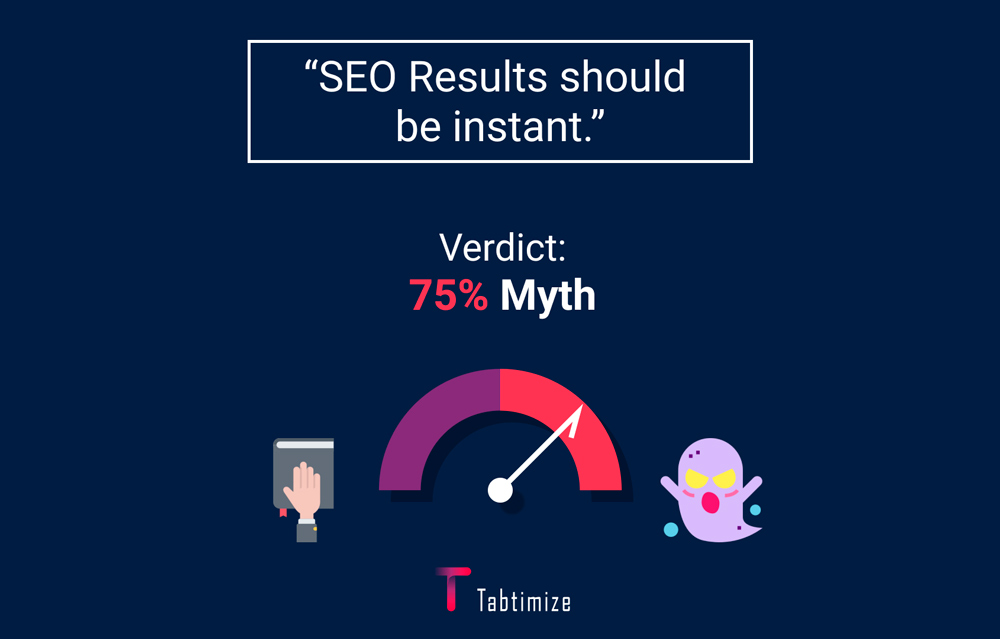
“If anyone promises to help your keyword instantly rank #1 on Google, don’t believe them.”
This myth is one of the most dangerous and likely originates from people looking for quick wins with the least effort. While you might get lucky and see immediate results with select keywords —it’s an unlikely (and rare) event. Most often, rankings won’t budge until after several months, which is when you’ll see the true benefits of your SEO efforts. As SEO is a long-term strategy, it’s difficult to measure the results in a short time frame. The key is to monitor and experiment with keywords along the way.
SEO Myth 2: “SEO is just about buying as many links as possible.”
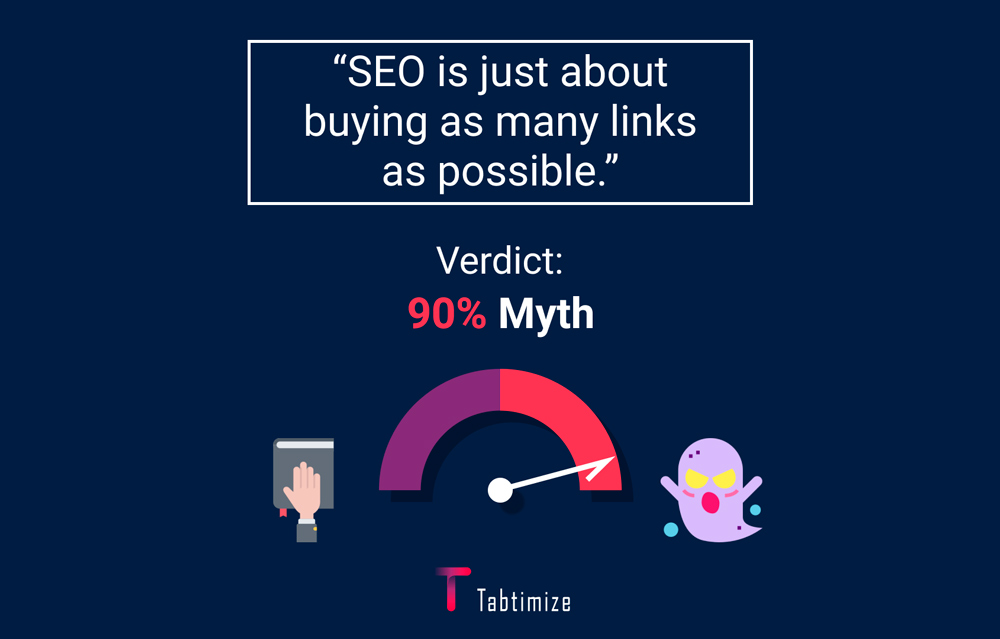
As a general rule, if you’re able to buy multiple links at a low price—chances are they’re not relevant and have no domain authority. In short, they’re worthless. Buying links in bulk can be a common (though black hat) activity, and we never recommend you to do so. You’d be committing a big no-no if you buy backlinks specifically to boost your rankings, as it directly goes against Google’s Webmaster Guidelines. Buying large amounts of random backlinks from link farms or FFA sites can land you in hot water and place your brand next to shady websites that could make your brand reputation suffer. Quality of links always wins over quantity.
SEO Myth 3: “The type of links don’t matter, and neither does content.”
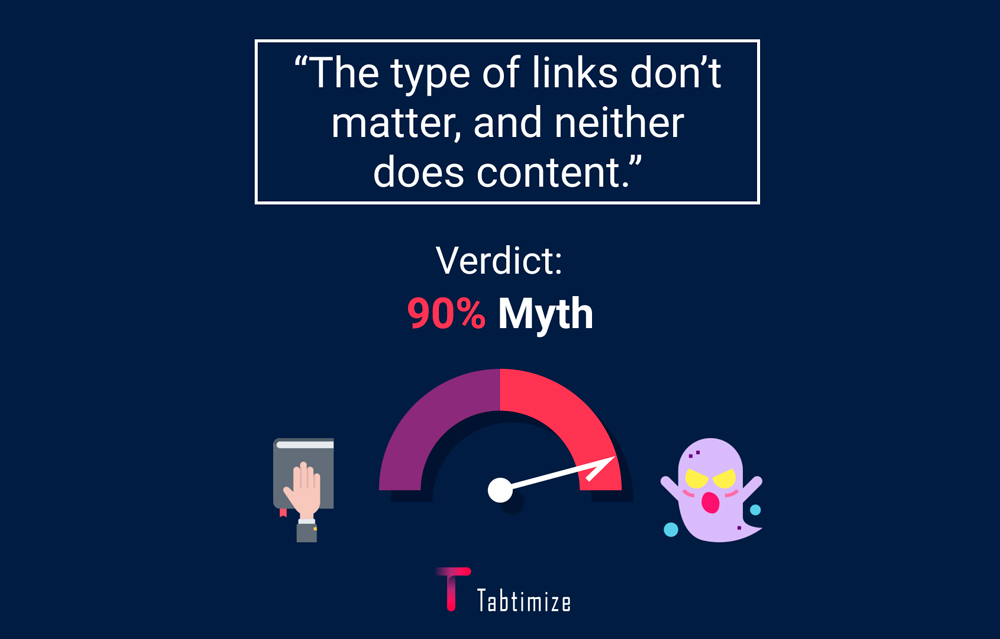
As we touched on above, you can be sure that the type of link matters! Random backlinks that don’t have any relevance or authority won’t add any value to your page. The more random links you have on your page, the less they are worth, and might also get you penalized by Google.
Link building is arguably one of the most transformative SEO activities to amplify traffic and a must-have in every strategic marketer’s toolbox. Backlinks and content strategy work synergistically, and without purposeful and engaging content your audience won’t be able to make purchasing decisions or convert into leads.
SEO Myth 4: “White hat SEO takes too long.”
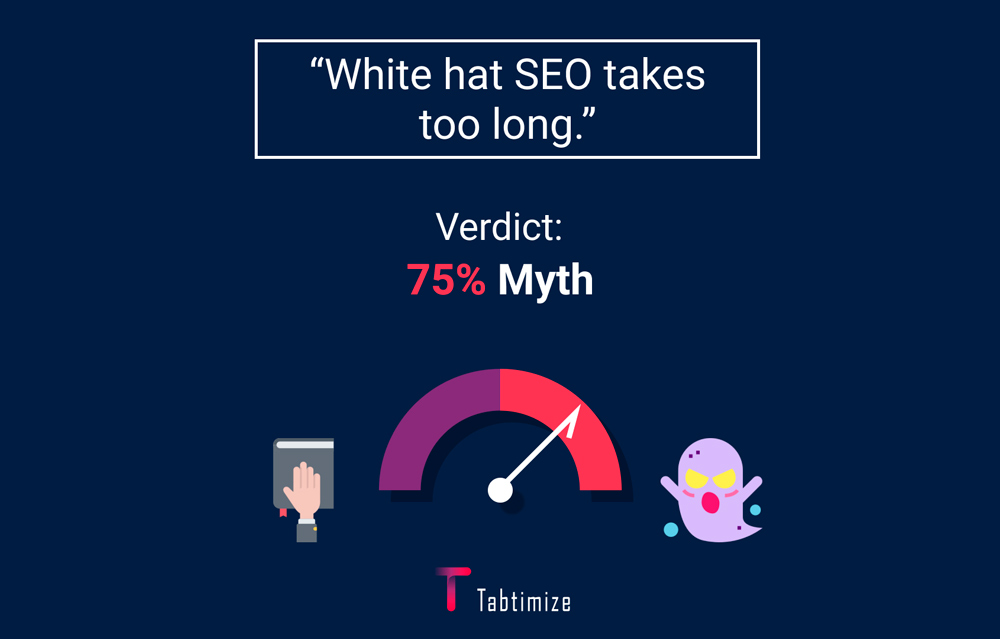
While results can take some time to show with White hat SEO, you can guarantee that they will be more sustainable. As we touched on in previous points, the downsides of Black hat SEO could cost you penalties and reputational damage.
It’s important to remember that Google updates and complicates its algorithms and ranking factors frequently, so it’s essential for marketers to stay up to date with the changes and make sure they’re operating under Google’s guidelines. Sites that consistently stick with White hat practices avoid being heavily sanctioned by Google and consistently rank higher in SERP positions, due mostly to their adherence to the rules. It’s a process that takes time but offers stable and sustainable results.
SEO Myth 5: “Keyword research doesn’t matter.”
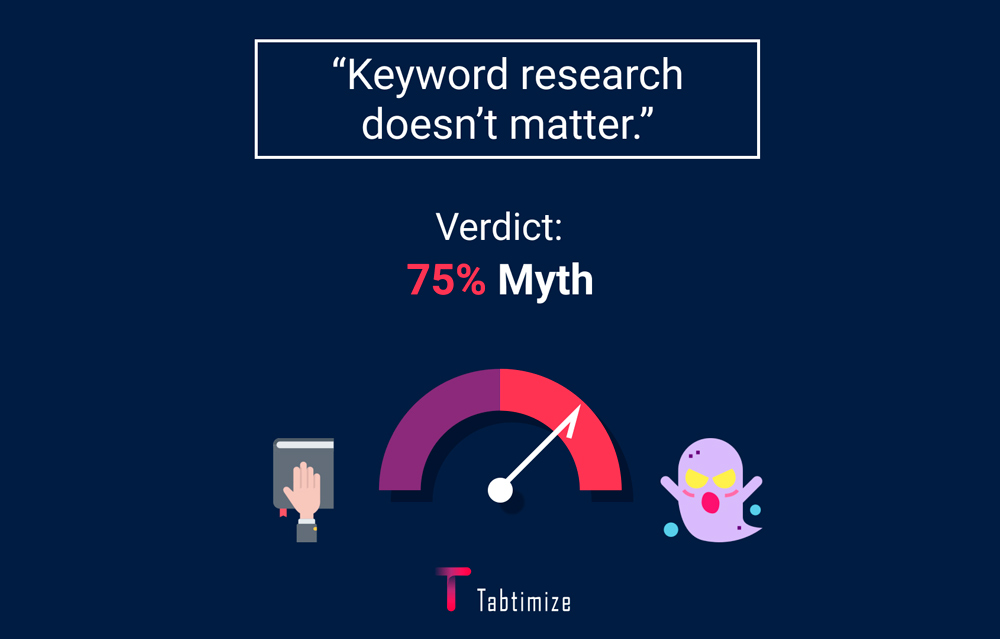
You could irreparably hurt your SEO efforts if you ignore insightful keyword research for your website. Keyword research helps to attract as much organic traffic to your page as possible, a permanent aim of SEO. Performing quality keyword research ensures that you’re optimizing keywords with the user’s intent in mind, and also for the most frequently used way of searching for a topic.
SEO Myth 6: “Keyword density is super important.”
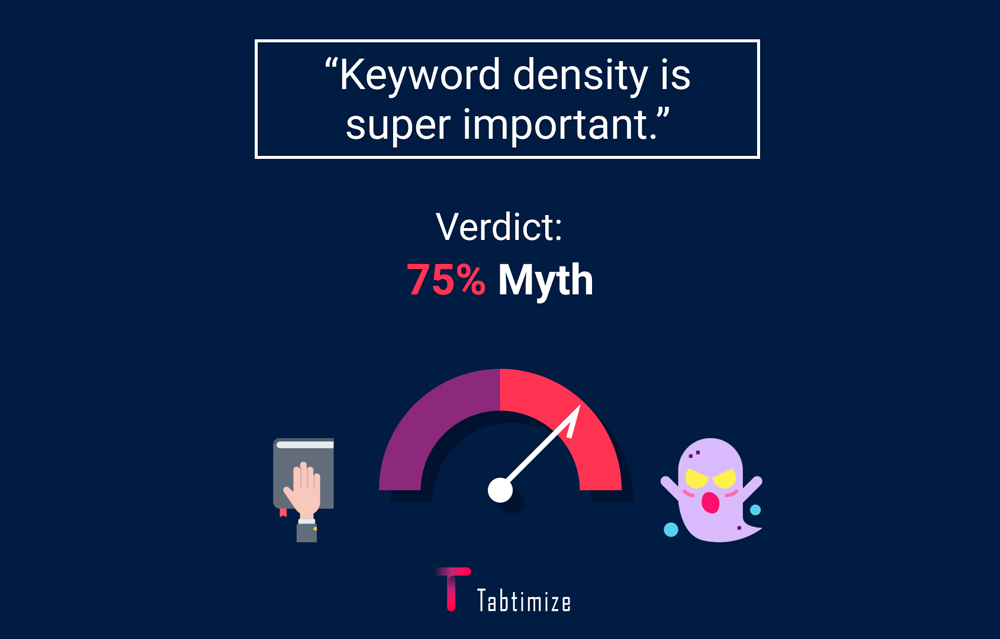
Is mentioning a keyword you want to rank for within your content, useful? Well, of course, it is. But there isn’t an X number of times you need to mention it for the search engine to pick up on what you’re talking about. The algorithm is smart, and with technology breakthroughs like semantic search—you don’t need to drop keywords every other sentence.
Fun Fact: Tabtimize also uses the power of semantic understanding to find the contextual correlation between pages. It can break down into percentage points how relevant one piece of content is to the other, making requesting backlinks between sites easy and pitch-free. Neat, right?
SEO Myth 7: “SEO is very expensive.”
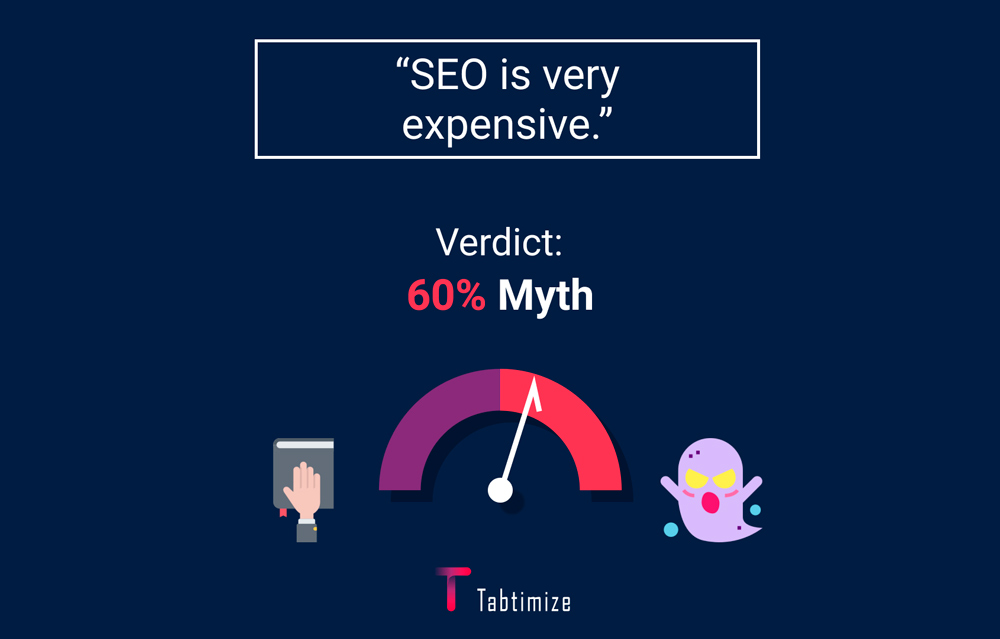
It can be, but it doesn’t always have to be.
How expensive or economical SEO is, entirely depends upon your organizational needs, objectives, and competitive environment. If you’re a large corporation looking to increase your footprint globally, operate in a hyper-competitive environment, and have significant organizational needs—the cost of overhauling such a large SEO effort will be high. Compare that to a small business looking to increase its local visibility. SEO packages and pricing can be customized based on your individual needs and objectives and don’t always need to be ultra-expensive. This is probably also one of the most circulated myths out there, that need to be put to rest.
SEO Myth 8: “Long-form content means you will rank higher.”
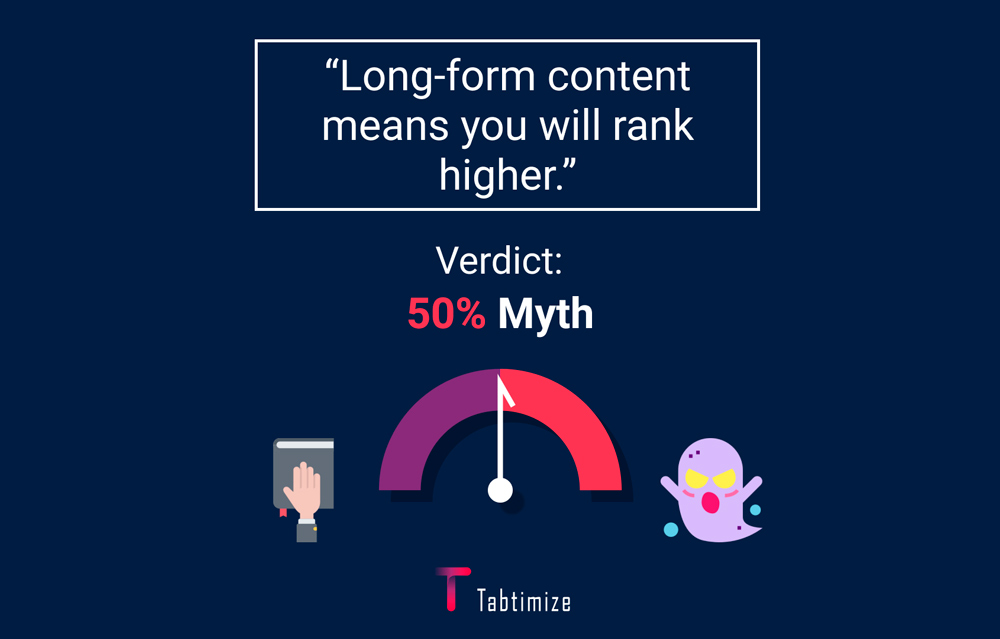
After Google released the Hummingbird algorithm, the focus is now on user intent, solving user problems, and providing added value. Long-form content is only really useful if it provides this and is closely modeled with user intent in mind. Long-form content can help with rankings if it’s part of a broader content strategy, but shouldn’t be the backbone of it. Not every behemoth blog post or article is going to reach every user, so it’s better to scrap the notion that all your content needs to be lengthy—and instead focus on user problems it can solve or what intent it captures.
Still not convinced? We performed a Content vs. Word count test, that proves that relevant content is more important than word count.
Check it out.
SEO Myth 9: “Anyone can do SEO in 2022.”
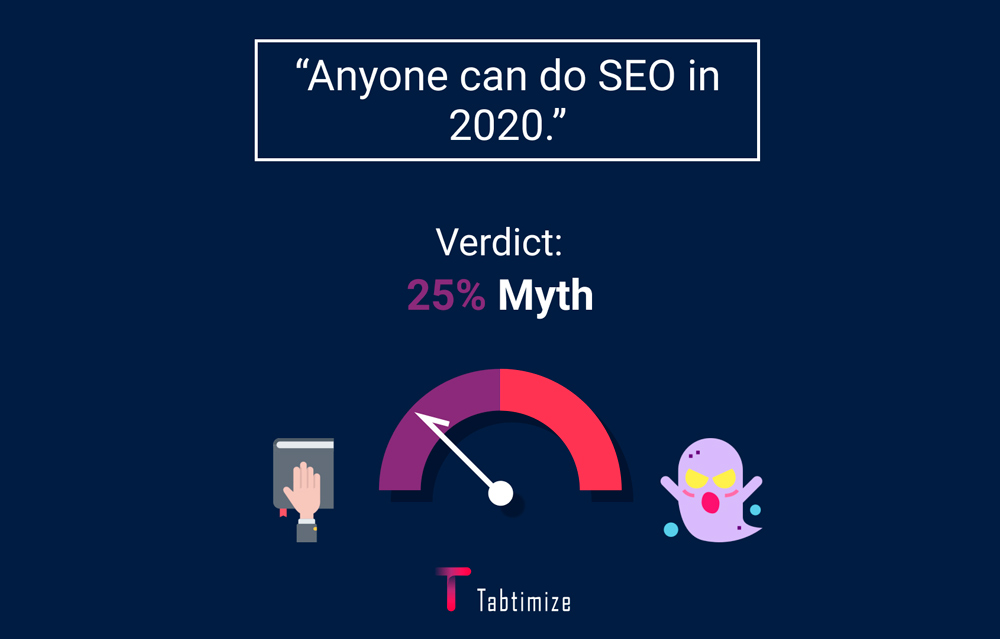
It’s a dangerous notion to think that you can take on all the responsibility of SEO optimization without having the proper training for it. Though certain things may seem straightforward and logical, you can risk more harm than good if you aren’t 100% aware of how search engines work. By not following Google’s regulations, keeping up to date with the multiple algorithm changes, and working within White Hat guidelines—you could risk causing your rankings to plummet, getting multiple penalties, and possibly getting de-indexed by Google. If you’re unsure about the right way to go about SEO, it’s always a great idea to get some help. In fact, thousands of experienced marketers and agencies rely on the help of outside SEO specialists to ensure they’re getting the best results.
SEO Myth 10: “SEO is a waste of time.”
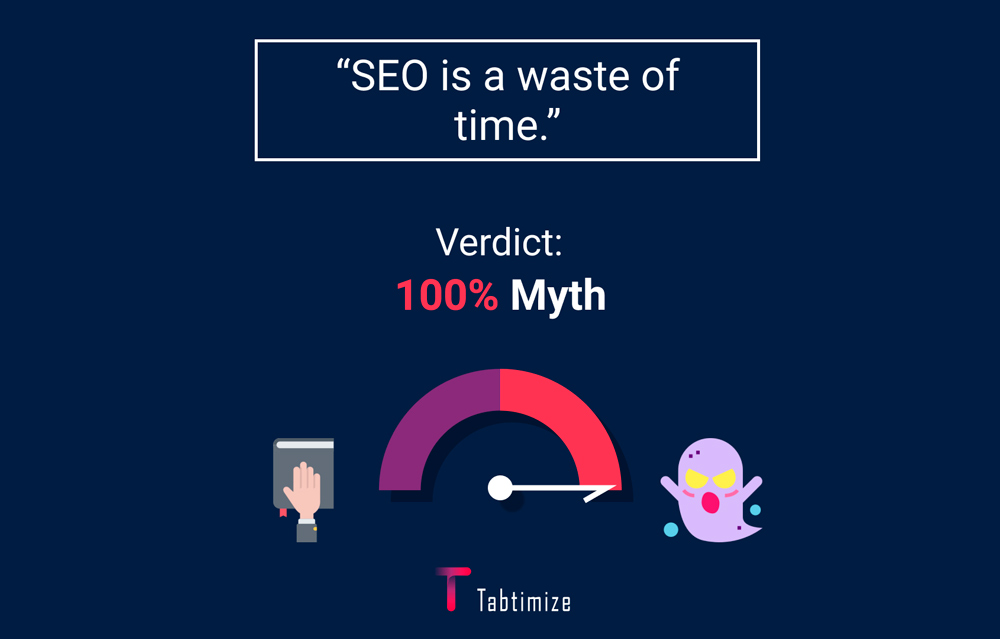
If it was, no one would bother with it.
Big companies wouldn’t be rushing to bring in large teams of SEO specialists and professionals to help their marketing efforts dominate their respective industries, or startups and small businesses wouldn’t be using it as a scalable high growth channel. SEO is so effective because of the vast number of high-intent searches that are done on it every single day. It’s extremely important to remember that SEO is not a short-term game, you can’t expect to only work on it for a few weeks, a few months, or even a year and then call it quits. For organic results to show, you need to invest both your time and effort to reap valuable rewards.
Your SEO strategy needs to be ongoing and user-centric if you don’t want to get displaced by your competition.
So what advice would Tabtimize give to an SEO newbie to get them on the right track?
SEO is constantly evolving, and so should your approach to it.
It’s important to stay ahead of the curve and keep an eye out for false facts that could cause harm to your SEO efforts.
We at Tabtimize know that SEO optimization is no easy feat, which is why we recommend:
- Listen closely and learn from industry experts – Keep an eye out for the blogs of Marketing & SEO influencers on YouTube, Twitter, or any other social media platform of your choice. Industry experts such as John Mueller, Rand Fishkin, and countless others are information goldmines and regularly give valuable SEO advice.
- Read Google’s blogs and stay up to date with algorithm changes & best practices.
- Focus on high-quality, intent-driven content, technical optimization, and contextually relevant backlinks.
Closing Comments
It’s important to consider the advice of others in the SEO industry, but always take things with a grain of salt.
As we explored in this article, some SEO information can be outdated and not usable in today’s context.
I’ve had my fair share of difficulties with SEO and am curious to know what your experiences have been like? Are there any myths I’ve left out? Let me know in the comments below.

I hope you’ll find this post useful.
If you’d like to find out how you can sign up to Tabtimize for free, Sign up below.



